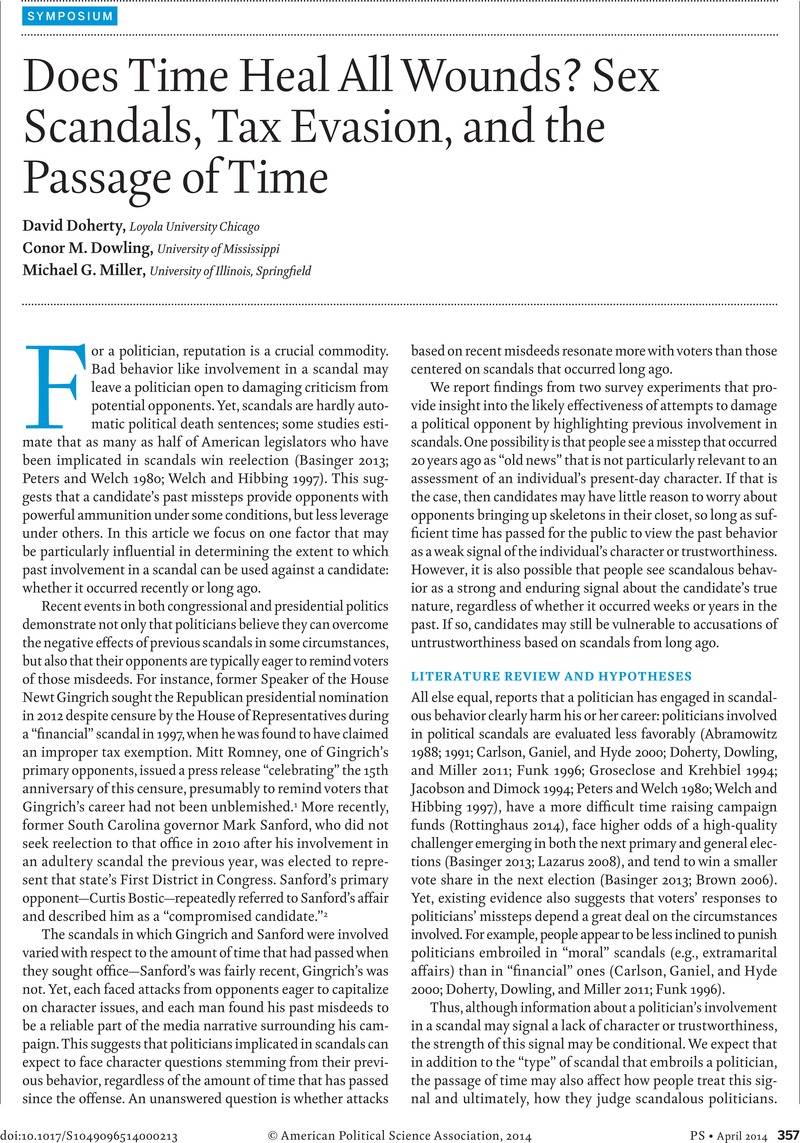Crossref Citations
This article has been cited by the following publications. This list is generated based on data provided by Crossref.
McDermott, Monika L.
Schwartz, Douglas
and
Vallejo, Sebastian
2015.
Talking the Talk but Not Walking the Walk.
American Politics Research,
Vol. 43,
Issue. 6,
p.
952.
Ares, Macarena
and
Hernández, Enrique
2017.
The corrosive effect of corruption on trust in politicians: Evidence from a natural experiment.
Research & Politics,
Vol. 4,
Issue. 2,
Newmark, Adam J.
Vaughan, Shannon K.
and
Pleites‐Hernandez, Giovanny D.
2019.
Surviving Political Scandals: Why Some Transgressions End Political Careers and Others Do Not.
Social Science Quarterly,
Vol. 100,
Issue. 4,
p.
1268.
Pereira, Miguel M.
and
Waterbury, Nicholas W.
2019.
Do Voters Discount Political Scandals over Time?.
Political Research Quarterly,
Vol. 72,
Issue. 3,
p.
584.
Stockemer, Daniel
and
Praino, Rodrigo
2019.
The Good, the Bad and the Ugly: Do Attractive Politicians Get a ‘Break’ When They are Involved in Scandals?.
Political Behavior,
Vol. 41,
Issue. 3,
p.
747.
Darr, Joshua P.
Kalmoe, Nathan P.
Searles, Kathleen
Sui, Mingxiao
Pingree, Raymond J.
Watson, Brian K.
Bryanov, Kirill
and
Santia, Martina
2019.
Collision with Collusion: Partisan Reaction to the Trump-Russia Scandal.
Perspectives on Politics,
Vol. 17,
Issue. 3,
p.
772.
Gaskins, Ben
Seljan, Ellen
Lochner, Todd
Kowal, Katie
Dundon, Zane
and
Gold, Maya
2019.
From the FEC to the Ballot Box: Voter Accountability for Campaign Finance Law Violations.
American Politics Research,
Vol. 47,
Issue. 5,
p.
1000.
Hamel, Brian T.
and
Miller, Michael G.
2019.
How Voters Punish and Donors Protect Legislators Embroiled in Scandal.
Political Research Quarterly,
Vol. 72,
Issue. 1,
p.
117.
Basinger, Scott J.
2019.
Judging Incumbents’ Character: The Impact of Scandal.
Journal of Political Marketing,
Vol. 18,
Issue. 3,
p.
216.
Bågenholm, Andreas
and
Charron, Nicholas
2020.
Accountable or Untouchable? Electoral accountability in Romanian local elections.
Electoral Studies,
Vol. 66,
Issue. ,
p.
102183.
Swire‐Thompson, Briony
Ecker, Ullrich K. H.
Lewandowsky, Stephan
and
Berinsky, Adam J.
2020.
They Might Be a Liar But They’re My Liar: Source Evaluation and the Prevalence of Misinformation.
Political Psychology,
Vol. 41,
Issue. 1,
p.
21.
van Elsas, Erika J.
Brosius, Anna
Marquart, Franziska
and
De Vreese, Claes H.
2020.
How political malpractice affects trust in EU institutions.
West European Politics,
Vol. 43,
Issue. 4,
p.
944.
Barnes, Tiffany D.
Beaulieu, Emily
and
Saxton, Gregory W.
2020.
Sex and corruption: how sexism shapes voters’ responses to scandal.
Politics, Groups, and Identities,
Vol. 8,
Issue. 1,
p.
103.
Paschall, Collin
Sulkin, Tracy
and
Bernhard, William
2020.
The Legislative Consequences of Congressional Scandals.
Political Research Quarterly,
Vol. 73,
Issue. 2,
p.
293.
Costa, Mia
Briggs, Trevor
Chahal, Ajaipal
Fried, Jonathan
Garg, Rijul
Kriz, Sophia
Lei, Leo
Milne, Anthony
and
Slayton, Jennah
2020.
How partisanship and sexism influence voters’ reactions to political #MeToo scandals.
Research & Politics,
Vol. 7,
Issue. 3,
Armendariz, Karen O. Caballero
Farrer, Ben
and
Martinez, Monica
2020.
Badge of Courage or Sign of Criminality? Experimental Evidence for How Voters Respond to Candidates Who Were Arrested at a Protest.
Social Science Quarterly,
Vol. 101,
Issue. 6,
p.
2203.
Courtemanche, Marie
and
Connor Green, Joanne
2020.
A Fall from Grace: Women, Scandals, and Perceptions of Politicians.
Journal of Women, Politics & Policy,
Vol. 41,
Issue. 2,
p.
219.
Gulati, Jeff
and
Brown, Lara M.
2021.
The Personal is Political: Reconsidering the Impact of Scandals on Congressional Incumbents.
Congress & the Presidency,
Vol. 48,
Issue. 1,
p.
25.
Yoong, David
2021.
How did 1MDB’s CEO manage impressions of culpability in an accountability interview?.
Text & Talk,
Vol. 41,
Issue. 3,
p.
417.
Karv, Thomas
and
Strandberg, Kim
2022.
Lowered Expectations and Shifting Standards? – Two Survey Experiments exploring Neo‐populist Political Scandals and the Perceived Trustworthiness of Politicians.
Scandinavian Political Studies,
Vol. 45,
Issue. 2,
p.
178.



